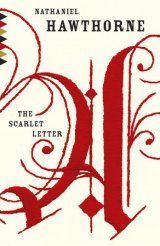The Scarlet Letter Page #2
First published in 1850, The Scarlet Letter is Nathaniel Hawthorne's masterpiece and one of the greatest American novels. Its themes of sin, guilt, and redemption, woven through a story of adultery in the early days of the Massachusetts Colony, are revealed with remarkable psychological penetration and understanding of the human heart.
Cluster all these individuals together, as they sometimes were, with other miscellaneous ones to diversify the group, and, for the time being, it made the Custom-House a stirring scene. More frequently, however, on ascending the steps, you would discern-- in the entry if it were summer time, or in their appropriate rooms if wintry or inclement weathers--a row of venerable figures, sitting in old-fashioned chairs, which were tipped on their hind legs back against the wall. Oftentimes they were asleep, but occasionally might be heard talking together, in voices between a speech and a snore, and with that lack of energy that distinguishes the occupants of alms-houses, and all other human beings who depend for subsistence on charity, on monopolized labour, or anything else but their own independent exertions. These old gentlemen--seated, like Matthew at the receipt of custom, but not very liable to be summoned thence, like him, for apostolic errands--were Custom-House officers. Furthermore, on the left hand as you enter the front door, is a certain room or office, about fifteen feet square, and of a lofty height, with two of its arched windows commanding a view of the aforesaid dilapidated wharf, and the third looking across a narrow lane, and along a portion of Derby Street. All three give glimpses of the shops of grocers, block-makers, slop-sellers, and ship-chandlers, around the doors of which are generally to be seen, laughing and gossiping, clusters of old salts, and such other wharf-rats as haunt the Wapping of a seaport. The room itself is cobwebbed, and dingy with old paint; its floor is strewn with grey sand, in a fashion that has elsewhere fallen into long disuse; and it is easy to conclude, from the general slovenliness of the place, that this is a sanctuary into which womankind, with her tools of magic, the broom and mop, has very infrequent access. In the way of furniture, there is a stove with a voluminous funnel; an old pine desk with a three-legged stool beside it; two or three wooden-bottom chairs, exceedingly decrepit and infirm; and--not to forget the library--on some shelves, a score or two of volumes of the Acts of Congress, and a bulky Digest of the Revenue laws. A tin pipe ascends through the ceiling, and forms a medium of vocal communication with other parts of the edifice. And here, some six months ago--pacing from corner to corner, or lounging on the long-legged stool, with his elbow on the desk, and his eyes wandering up and down the columns of the morning newspaper--you might have recognised, honoured reader, the same individual who welcomed you into his cheery little study, where the sunshine glimmered so pleasantly through the willow branches on the western side of the Old Manse. But now, should you go thither to seek him, you would inquire in vain for the Locofoco Surveyor. The besom of reform hath swept him out of office, and a worthier successor wears his dignity and pockets his emoluments. This old town of Salem--my native place, though I have dwelt much away from it both in boyhood and maturer years--possesses, or did possess, a hold on my affection, the force of which I have never realized during my seasons of actual residence here. Indeed, so far as its physical aspect is concerned, with its flat, unvaried surface, covered chiefly with wooden houses, few or none of which pretend to architectural beauty--its irregularity, which is neither picturesque nor quaint, but only tame--its long and lazy street, lounging wearisomely through the whole extent of the peninsula, with Gallows Hill and New Guinea at one end, and a view of the alms-house at the other--such being the features of my native town, it would be quite as reasonable to form a sentimental attachment to a disarranged checker-board. And yet, though invariably happiest elsewhere, there is within me a feeling for Old Salem, which, in lack of a better phrase, I must be content to call affection. The sentiment is probably assignable to the deep and aged roots which my family has stuck into the soil. It is now nearly two centuries and a quarter since the original Briton, the earliest emigrant of my name, made his appearance in the wild and forest-bordered settlement which has since become a city. And here his descendants have been born and died, and have mingled their earthly substance with the soil, until no small portion of it must necessarily be akin to the mortal frame wherewith, for a little while, I walk the streets. In part, therefore, the attachment which I speak of is the mere sensuous sympathy of dust for dust. Few of my countrymen can know what it is; nor, as frequent transplantation is perhaps better for the stock, need they consider it desirable to know. But the sentiment has likewise its moral quality. The figure of that first ancestor, invested by family tradition with a dim and dusky grandeur, was present to my boyish imagination as far back as I can remember. It still haunts me, and induces a sort of home-feeling with the past, which I scarcely claim in reference to the present phase of the town. I seem to have a stronger claim to a residence here on account of this grave, bearded, sable-cloaked, and steeple-crowned progenitor--who came so early, with his Bible and his sword, and trode the unworn street with such a stately port, and made so large a figure, as a man of war and peace--a stronger claim than for myself, whose name is seldom heard and my face hardly known. He was a soldier, legislator, judge; he was a ruler in the Church; he had all the Puritanic traits, both good and evil. He was likewise a bitter persecutor; as witness the Quakers, who have remembered him in their histories, and relate an incident of his hard severity towards a woman of their sect, which will last longer, it is to be feared, than any record of his better deeds, although these were many. His son, too, inherited the persecuting spirit, and made himself so conspicuous in the martyrdom of the witches, that their blood may fairly be said to have left a stain upon him. So deep a stain, indeed, that his dry old bones, in the Charter-street burial-ground, must still retain it, if they have not crumbled utterly to dust! I know not whether these ancestors of mine bethought themselves to repent, and ask pardon of Heaven for their cruelties; or whether they are now groaning under the heavy consequences of them in another state of being. At all events, I, the present writer, as their representative, hereby take shame upon myself for their sakes, and pray that any curse incurred by them--as I have heard, and as the dreary and unprosperous condition of the race, for many a long year back, would argue to exist--may be now and henceforth removed.
Translation
Translate and read this book in other languages:
Select another language:
- - Select -
- 简体中文 (Chinese - Simplified)
- 繁體中文 (Chinese - Traditional)
- Español (Spanish)
- Esperanto (Esperanto)
- 日本語 (Japanese)
- Português (Portuguese)
- Deutsch (German)
- العربية (Arabic)
- Français (French)
- Русский (Russian)
- ಕನ್ನಡ (Kannada)
- 한국어 (Korean)
- עברית (Hebrew)
- Gaeilge (Irish)
- Українська (Ukrainian)
- اردو (Urdu)
- Magyar (Hungarian)
- मानक हिन्दी (Hindi)
- Indonesia (Indonesian)
- Italiano (Italian)
- தமிழ் (Tamil)
- Türkçe (Turkish)
- తెలుగు (Telugu)
- ภาษาไทย (Thai)
- Tiếng Việt (Vietnamese)
- Čeština (Czech)
- Polski (Polish)
- Bahasa Indonesia (Indonesian)
- Românește (Romanian)
- Nederlands (Dutch)
- Ελληνικά (Greek)
- Latinum (Latin)
- Svenska (Swedish)
- Dansk (Danish)
- Suomi (Finnish)
- فارسی (Persian)
- ייִדיש (Yiddish)
- հայերեն (Armenian)
- Norsk (Norwegian)
- English (English)
Citation
Use the citation below to add this book to your bibliography:
Style:MLAChicagoAPA
"The Scarlet Letter Books." Literature.com. STANDS4 LLC, 2024. Web. 21 Dec. 2024. <https://www.literature.com/book/the_scarlet_letter_160>.




Discuss this The Scarlet Letter book with the community:
Report Comment
We're doing our best to make sure our content is useful, accurate and safe.
If by any chance you spot an inappropriate comment while navigating through our website please use this form to let us know, and we'll take care of it shortly.
Attachment
You need to be logged in to favorite.
Log In